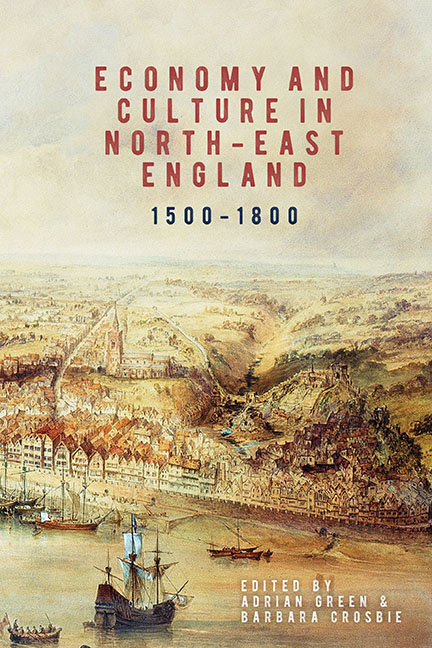Book contents
- Frontmatter
- Contents
- List of Maps, Figures and Tables
- Preface
- Contributors
- Foreword
- List of Abbreviations
- Map
- Introduction: ‘Beyond Coal and Class’: Economy and Culture in North-East England, 1500–1800
- 1 Church Leaseholders on Durham Cathedral's Estate, 1540–1640: The Rise of a Rural Elite?
- 2 Durham Ox: Commercial Agriculture in North-East England, 1600–1800
- 3 Fluctuating Fortunes: The Bowes Family and Lead Mining Concessions, 1550–1720
- 4 Material Matters: Improving Berwick-upon-Tweed's Urban Environment, 1551–1603
- 5 Work before Play: The Occupational Structure of Newcastle upon Tyne, 1600–1710
- 6 Maintaining Moral Integrity: The Cultural and Economic Relationships of Quakers in North-East England, 1653–1700
- 7 Shipping on the Tyne: The Growth and Diversification of Seaborne Trade in the Eighteenth Century
- 8 From Carboniferous Capitalism to Complementary Commerce: Coastal and Overland Trade between North-East England and Scotland, 1580–1750
- 9 Provincial Purveyors of Culture: The Print Trade in Eighteenth- Century Newcastle upon Tyne
- 10 Parish, River, Region and Nation: Networks of Power in Eighteenth-Century Wearside
- Bibliography
- Index
- Volumes Already Published
1 - Church Leaseholders on Durham Cathedral's Estate, 1540–1640: The Rise of a Rural Elite?
Published online by Cambridge University Press: 13 July 2019
- Frontmatter
- Contents
- List of Maps, Figures and Tables
- Preface
- Contributors
- Foreword
- List of Abbreviations
- Map
- Introduction: ‘Beyond Coal and Class’: Economy and Culture in North-East England, 1500–1800
- 1 Church Leaseholders on Durham Cathedral's Estate, 1540–1640: The Rise of a Rural Elite?
- 2 Durham Ox: Commercial Agriculture in North-East England, 1600–1800
- 3 Fluctuating Fortunes: The Bowes Family and Lead Mining Concessions, 1550–1720
- 4 Material Matters: Improving Berwick-upon-Tweed's Urban Environment, 1551–1603
- 5 Work before Play: The Occupational Structure of Newcastle upon Tyne, 1600–1710
- 6 Maintaining Moral Integrity: The Cultural and Economic Relationships of Quakers in North-East England, 1653–1700
- 7 Shipping on the Tyne: The Growth and Diversification of Seaborne Trade in the Eighteenth Century
- 8 From Carboniferous Capitalism to Complementary Commerce: Coastal and Overland Trade between North-East England and Scotland, 1580–1750
- 9 Provincial Purveyors of Culture: The Print Trade in Eighteenth- Century Newcastle upon Tyne
- 10 Parish, River, Region and Nation: Networks of Power in Eighteenth-Century Wearside
- Bibliography
- Index
- Volumes Already Published
Summary
The decline of the peasantry and the associated emergence of the yeomanry as a social group in England has long provoked questions about the role of economic and cultural factors, as for instance over whether their relative market orientation represented oppressive seigniorial exactions or a unique peasant mentality. Eric Wolf's distinction that a ‘peasant runs a household, not a business concern’, succinctly represents this debate, suggesting not only a quantitative difference between commercial farmers and peasantries but also a qualitative one. Perhaps the most radical cultural definition of peasants in this period was applied by Alan Macfarlane, who drew upon anthropological studies of late nineteenth-century Polish and Russian peasantries to establish the characteristics of a peasant society in which there were no institutional property rights because land was vested in the family group. There could, therefore, be neither sale nor inheritance of goods, for no individual ‘owned’ them, and so he concluded that English society displayed a remarkable degree of individualism which precluded the existence of a peasantry. However, Jane Whittle has criticised this as being an ‘unusually constrictive definition of peasant society and economy, stressing an almost total lack of market relations in peasant societies’, whilst Henry French and Richard Hoyle have similarly criticised it for there ‘seemed to be no good reason why one historically specific form of peasantry should be the standard against which all others should be judged’. These three historians have in turn provided alternative definitions of peasant societies, with Whittle concluding that peasants are ‘small-scale agricultural producers who are in possession of land which is farmed primarily with family labour and with the main aim of providing the family directly with a means of subsistence’.
French and Hoyle, in their work on Earls Colne (Essex), have, furthermore, emphasised that there was a transformation in the mentalities of early modern farmers that was a key process in the decline of the English peasantry. They bear quoting at length:
We suggest that it was not only economic factors which forced small farmers out of farming, and drove the consolidation of their holdings, but that the change from a peasant to a non-peasant mindset was a crucial element in the dissolution of the peasantry as a social group.
- Type
- Chapter
- Information
- Economy and Culture in North-East England, 1500–1800 , pp. 21 - 43Publisher: Boydell & BrewerPrint publication year: 2018

